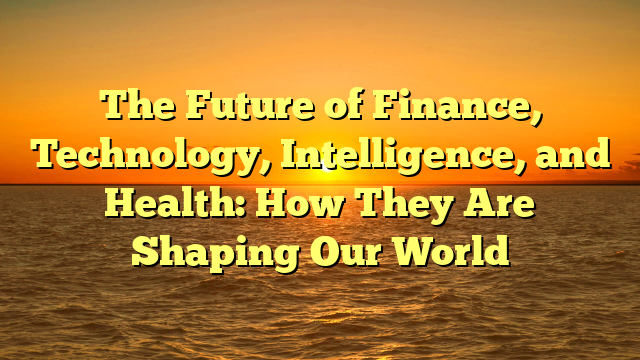In today’s rapidly evolving world, four major forces — finance, technology, intelligence, and health — are shaping the way we live, work, and interact with each other. These domains are not isolated; rather, they influence and complement one another in significant ways, creating new opportunities, challenges, and innovations. This article will explore how each of these forces impacts our society and what the future holds for them.
1. The Impact of Finance on Global Development
Finance is the lifeblood of economic growth and stability. It encompasses everything from personal banking and investments to corporate financing and government spending. Over the years, the financial industry has undergone tremendous changes, driven by technological advancements and changing consumer behavior. The rise of digital payments, cryptocurrencies, and mobile banking is revolutionizing how we handle money. Furthermore, the global financial system is more interconnected than ever, with investments flowing across borders and impacting economies worldwide.
The future of finance is deeply intertwined with technology, especially in areas like artificial intelligence and machine learning. As we move toward a more digital-first financial world, institutions must remain vigilant to emerging risks, such as cyberattacks and fraud. Additionally, economic inequality remains a persistent issue, and the role of finance in addressing this gap will be crucial in ensuring a more equitable global society.
2. The Role of Technology in Shaping Our Future
In an age defined by rapid technological advancements, the impact on society is profound. The rise of AI, 5G, and smart technologies is redefining how industries operate, from manufacturing and healthcare to finance and entertainment. While technology offers tremendous potential for improving quality of life, it also introduces new challenges, including the need for digital literacy, cybersecurity, and ethical considerations.
The intersection of technology and healthcare is creating groundbreaking changes in the way we monitor and manage our health. Innovations like telemedicine, AI-powered diagnostics, and personalized medicine are transforming healthcare delivery. With the advent of AI and big data, health professionals can offer more precise treatments, leading to better outcomes for patients worldwide.
3. The Rise of Artificial Intelligence and Intelligence Systems
Artificial intelligence (AI) is one of the most powerful technologies of the 21st century, with the potential to revolutionize industries ranging from finance and healthcare to education and entertainment. AI is being used to automate routine tasks, analyze vast amounts of data, and improve decision-making processes. In finance, AI algorithms are being used to predict market trends and optimize investment strategies. In healthcare, AI is enabling more accurate diagnoses and personalized treatment plans.
However, Situs slot gacor of AI also raises ethical concerns. As AI systems become more sophisticated, there are concerns about privacy, job displacement, and the potential for biased decision-making. Ensuring that AI technologies are developed and implemented responsibly will be crucial for maximizing their benefits while minimizing negative impacts. Furthermore, the increasing reliance on AI could raise questions about human autonomy and control over decision-making.
4. Health and Well-being in the Digital Age
Health and well-being are increasingly becoming a focus of technological innovation. In addition to advancements in medical science, digital tools are being used to improve personal health management. Wearable fitness trackers, mobile health apps, and online therapy services are just a few examples of how technology is empowering individuals to take control of their health. These tools allow users to monitor their activity levels, track nutrition, and even access mental health resources without leaving their homes.
Moreover, the digital health revolution is enabling greater access to healthcare in underserved areas. With telemedicine platforms, patients in remote regions can consult with doctors, reducing the need for long-distance travel and improving overall access to care. This has the potential to address health disparities and provide better healthcare outcomes for populations that were previously underserved.
Conclusion
Finance, technology, intelligence, and health are powerful forces driving global progress. While they offer significant potential for improving our lives, they also present challenges that require careful management. By embracing these innovations and addressing the associated risks, we can pave the way for a brighter, more inclusive future for everyone.
